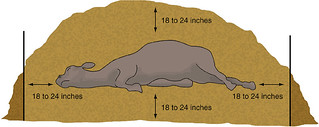Proper disposal of dead livestock is producer’s responsibility
October 3, 2014
(487 words)
PINE BLUFF, Ark. – As one producer said, “At some point, livestock become dead stock.”
David Fernandez, Cooperative Extension Program livestock specialist at the University of Arkansas at Pine Bluff, reminds producers to be prepared to properly dispose of animals that die on their farms. Disposing of carcasses in locations where they might contaminate surface water or wells is illegal in Arkansas.
“Several methods for the disposal of livestock carcasses are acceptable under Arkansas law,” Fernandez said. “These include rendering, burial, extrusion, cooking for swine feed, composting and incineration.”
Large animal carcasses may be sent to a renderer, but finding one to pick up large animals in Arkansas is difficult. Sheep and goat carcasses may not be accepted because of import regulations of other countries.
Buried animals must be covered with at least 2 feet of soil. They must also be at least 100 yards from a well and where surface water cannot be contaminated, he said. If you have a backhoe attachment for your tractor, digging a 3 to 6 feet deep hole to bury an animal properly may not be a problem. But, with only a shovel, it’s a big job.
Extrusion involves cooking the carcass for an extended period, then pressing it into pellets or another form of animal feed. Cooking carcasses for swine feed requires high heat. Incineration requires reducing the entire carcass to ash. Generally, while these methods are approved, Arkansas livestock producers do not have the facilities to use them.
If you cannot extrude, cook or incinerate and do not want to spend all day digging a deep hole only to fill it up again, what can you do? “The answer is composting,” Fernandez said.
Composting can be done in a simple compost pile, on a floor with a roof, or in a bin. “You need at least 24 inches of compostable material on all sides, top and bottom of the carcass to make sure carcass liquids are completely absorbed and to prevent leaching under the pile into the groundwater,” he says. This helps prevent flies from feeding and breeding in the carcass. It also keeps animals such as dogs and coyotes from digging the carcass out of the compost pile.
The compost pile must reach an internal peak temperature of 130 degrees Fahrenheit and must remain above 110 F to prevent disease-causing bacteria from growing. When the composting process is complete, all that remains is some easily broken bone. Compost provides an excellent source of organic matter for use on pastures or gardens to improve soil properties and fertility.
For a complete description of the rules governing livestock disposal in Arkansas, go to http://www.aad.arkansas.gov/Websites/aad/files/Content/5936682/Carcass_Disposal_Regulations_-_Poultry_.pdf .
For more information about composting livestock, go to http://www.uaex.uada.edu/publications/PDF/FSA-1044.pdf and read FSA 1044 “Organic Burial Composting of Cattle Mortality,” or http://www.uaex.uada.edu/publications/PDF/FSA-1045.pdf FSA 1045 “Two-Stage Poultry Mortality Composting-Daily Management is Essential.” If you have questions on this or other livestock-related issues, contact Fernandez at (870) 575-7214 or fernandezd@uapb.edu.
Pursuant to 7 CFR § 15.3, the University of Arkansas System Division of Agriculture offers all its Extension and Research programs and services (including employment) without regard to race, color, sex, national origin, religion, age, disability, marital or veteran status, genetic information, sexual preference, pregnancy or any other legally protected status, and is an equal opportunity institution.
By Carol Sanders, writer/editor
UAPB School of Agriculture, Fisheries and Human Sciences
(870) 575-7238
sandersc@uapb.edu
Related Links
